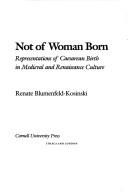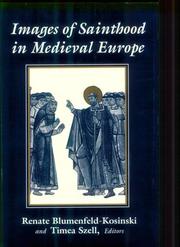| Listing 1 - 10 of 26 | << page >> |
Sort by
|

ISBN: 9042005130 9004490426 Year: 2000 Volume: 179 Publisher: Amsterdam Atlanta Rodopi
Abstract | Keywords | Export | Availability | Bookmark
 Loading...
Loading...Choose an application
- Reference Manager
- EndNote
- RefWorks (Direct export to RefWorks)
Old French literature --- Uitti, Karl D. --- French literature --- To 1500 --- History and criticism --- Literature [Medieval ]

ISBN: 0801422922 1501740482 0801499747 1501740474 Year: 1990 Publisher: Ithaca : Cornell University Press,
Abstract | Keywords | Export | Availability | Bookmark
 Loading...
Loading...Choose an application
- Reference Manager
- EndNote
- RefWorks (Direct export to RefWorks)
"Not of woman born, the Fortunate, the Unborn"-the terms designating those born by Caesarean section in medieval and Renaissance Europe were mysterious and ambiguous. Examining representations of Caesarean birth in legend and art and tracing its history in medical writing, Renate Blumenfeld-Kosinski addresses the web of religious, ethical, and cultural questions concerning abdominal delivery in the Middle Ages and the Renaissance. Not of Woman Born increases our understanding of the history of the medical profession, of medical iconography, and of ideas surrounding "unnatural" childbirth.Blumenfeld-Kosinski compares texts and visual images in order to trace the evolution of Caesarean birth as it was perceived by the main actors involved-pregnant women, medical practitioners, and artistic or literary interpreters. Bringing together medical treatises and texts as well as hitherto unexplored primary sources such as manuscript illuminations, she provides a fresh perspective on attitudes toward pregnancy and birth in the Middle Ages and the Renaissance; the meaning and consequences of medieval medicine for women as both patients and practitioners, and the professionalization of medicine. She discusses writings on Caesarean birth from the twelfth and thirteenth centuries, when Church Councils ordered midwives to perform the operation if a mother died during childbirth in order that the child might be baptized; to the fourteenth century, when the first medical text, Bernard of Gordon's Lilium medicinae, mentioned the operation; up to the gradual replacement of midwives by male surgeons in the fifteenth and sixteenth centuries. Not of Woman Born offers the first close analysis of Frarnois Rousset's 1581 treatise on the operation as an example of sixteenth-century medical discourse. It also considers the ambiguous nature of Caesarean birth, drawing on accounts of such miraculous examples as the birth of the Antichrist. An appendix reviews the complex etymological history of the term "Caesarean section."Richly interdisciplinary, Not of Woman Born will enliven discussions of the controversial issues surrounding Caesarean delivery today. Medical, social, and cultural historians interested in the Middle Ages and the Renaissance, historians, literary scholars, midwives, obstetricians, nurses, and others concerned with women's history will want to read it.
History of civilization --- anno 500-1499 --- Cesarean section in art --- Césarienne dans l'art --- Keizersnede in de kunst --- Cesarean Section --- Cesarean section --- Césarienne --- Illustration médicale --- -Cesarean section in art --- Abdominal delivery --- C section --- Caesarean delivery --- Caesarean section --- Delivery, Abdominal --- Delivery, Caesarean --- Delivery (Obstetrics) --- Illustration, Medical --- Cesarean section in art. --- Césarienne --- Césarienne dans l'art --- Illustration médicale --- Medicine in Art. --- Medical illustration --- -Renaissance --- Science in Art --- Art, Medicine in --- Art, Science in --- Arts, Medicine in --- Arts, Science in --- Medicine in Arts --- Science in Arts --- in Art, Medicine --- in Art, Science --- in Arts, Medicine --- in Arts, Science --- Renaissance --- Revival of letters --- history. --- psychology. --- History --- Europe. --- Northern Europe --- Southern Europe --- Western Europe --- Medicine in Art --- Civilization --- History, Modern --- Civilization, Medieval --- Civilization, Modern --- Humanism --- Middle Ages --- Obstetrics --- Art --- history --- psychology --- Surgery --- Medicine in the Arts. --- Renaissance. --- History. --- Civilisation médiévale --- Histoire --- Europe --- Civilization [Medieval ] --- Cesarean section - Europe - History. --- Medical illustration - History. --- Civilization, Medieval. --- Medicine in the Arts
Book
ISBN: 1501740490 Year: 2019 Publisher: Cornell University Press
Abstract | Keywords | Export | Availability | Bookmark
 Loading...
Loading...Choose an application
- Reference Manager
- EndNote
- RefWorks (Direct export to RefWorks)
"Not of woman born, the Fortunate, the Unborn"—the terms designating those born by Caesarean section in medieval and Renaissance Europe were mysterious and ambiguous. Examining representations of Caesarean birth in legend and art and tracing its history in medical writing, Renate Blumenfeld-Kosinski addresses the web of religious, ethical, and cultural questions concerning abdominal delivery in the Middle Ages and the Renaissance. Not of Woman Born increases our understanding of the history of the medical profession, of medical iconography, and of ideas surrounding "unnatural" childbirth.Blumenfeld-Kosinski compares texts and visual images in order to trace the evolution of Caesarean birth as it was perceived by the main actors involved—pregnant women, medical practitioners, and artistic or literary interpreters. Bringing together medical treatises and texts as well as hitherto unexplored primary sources such as manuscript illuminations, she provides a fresh perspective on attitudes toward pregnancy and birth in the Middle Ages and the Renaissance; the meaning and consequences of medieval medicine for women as both patients and practitioners, and the professionalization of medicine. She discusses writings on Caesarean birth from the twelfth and thirteenth centuries, when Church Councils ordered midwives to perform the operation if a mother died during childbirth in order that the child might be baptized; to the fourteenth century, when the first medical text, Bernard of Gordon's Lilium medicinae, mentioned the operation; up to the gradual replacement of midwives by male surgeons in the fifteenth and sixteenth centuries. Not of Woman Born offers the first close analysis of Frarnois Rousset's 1581 treatise on the operation as an example of sixteenth-century medical discourse. It also considers the ambiguous nature of Caesarean birth, drawing on accounts of such miraculous examples as the birth of the Antichrist. An appendix reviews the complex etymological history of the term "Caesarean section."Richly interdisciplinary, Not of Woman Born will enliven discussions of the controversial issues surrounding Caesarean delivery today. Medical, social, and cultural historians interested in the Middle Ages and the Renaissance, historians, literary scholars, midwives, obstetricians, nurses, and others concerned with women's history will want to read it."Not of woman born, the Fortunate, the Unborn"—the terms designating those born by Caesarean section in medieval and Renaissance Europe were mysterious and ambiguous. Examining representations of Caesarean birth in legend and art and tracing its history in medical writing, Renate Blumenfeld-Kosinski addresses the web of religious, ethical, and cultural questions concerning abdominal delivery in the Middle Ages and the Renaissance. Not of Woman Born increases our understanding of the history of the medical profession, of medical iconography, and of ideas surrounding "unnatural" childbirth.Blumenfeld-Kosinski compares texts and visual images in order to trace the evolution of Caesarean birth as it was perceived by the main actors involved—pregnant women, medical practitioners, and artistic or literary interpreters. Bringing together medical treatises and texts as well as hitherto unexplored primary sources such as manuscript illuminations, she provides a fresh perspective on attitudes toward pregnancy and birth in the Middle Ages and the Renaissance; the meaning and consequences of medieval medicine for women as both patients and practitioners, and the professionalization of medicine. She discusses writings on Caesarean birth from the twelfth and thirteenth centuries, when Church Councils ordered midwives to perform the operation if a mother died during childbirth in order that the child might be baptized; to the fourteenth century, when the first medical text, Bernard of Gordon's Lilium medicinae, mentioned the operation; up to the gradual replacement of midwives by male surgeons in the fifteenth and sixteenth centuries. Not of Woman Born offers the first close analysis of Frarnois Rousset's 1581 treatise on the operation as an example of sixteenth-century medical discourse. It also considers the ambiguous nature of Caesarean birth, drawing on accounts of such miraculous examples as the birth of the Antichrist. An appendix reviews the complex etymological history of the term "Caesarean section."Richly interdisciplinary, Not of Woman Born will enliven discussions of the controversial issues surrounding Caesarean delivery today. Medical, social, and cultural historians interested in the Middle Ages and the Renaissance, historians, literary scholars, midwives, obstetricians, nurses, and others concerned with women's history will want to read it.
Book
Year: 1997 Publisher: Stanford, CA : Stanford University Press,
Abstract | Keywords | Export | Availability | Bookmark
 Loading...
Loading...Choose an application
- Reference Manager
- EndNote
- RefWorks (Direct export to RefWorks)
Book
ISBN: 9780812224009 Year: 2015 Publisher: Philadelphia, Pa University of Pennsylvania Press
Abstract | Keywords | Export | Availability | Bookmark
 Loading...
Loading...Choose an application
- Reference Manager
- EndNote
- RefWorks (Direct export to RefWorks)
Book
ISBN: 0812224000 0812291336 Year: 2015 Publisher: Philadelphia : University of Pennsylvania Press,
Abstract | Keywords | Export | Availability | Bookmark
 Loading...
Loading...Choose an application
- Reference Manager
- EndNote
- RefWorks (Direct export to RefWorks)
In 1384, a poor and illiterate peasant woman named Ermine moved to the city of Reims with her elderly husband. Her era was troubled by war, plague, and schism within the Catholic Church, and Ermine could easily have slipped unobserved through the cracks of history. After the loss of her husband, however, things took a remarkable but frightening turn. For the last ten months of her life, Ermine was tormented by nightly visions of angels and demons. In her nocturnal terrors, she was attacked by animals, beaten and kidnapped by devils in disguise, and exposed to carnal spectacles; on other nights, she was blessed by saints, even visited by the Virgin Mary. She confessed these strange occurrences to an Augustinian friar known as Jean le Graveur, who recorded them all in vivid detail.Was Ermine a saint in the making, an impostor, an incipient witch, or a madwoman? Renate Blumenfeld-Kosinski ponders answers to these questions in the historical and theological context of this troubled woman's experiences. With empathy and acuity, Blumenfeld-Kosinski examines Ermine's life in fourteenth-century Reims, her relationship with her confessor, her ascetic and devotional practices, and her reported encounters with heavenly and hellish beings. Supplemented by translated excerpts from Jean's account, The Strange Case of Ermine de Reims brings to life an episode that helped precipitate one of the major clerical controversies of late medieval Europe, revealing surprising truths about the era's conceptions of piety and possession.
Mysticism --- Visions --- Women mystics --- Visionaries --- History --- Early works to 1800. --- Ermine, --- European History. --- Gender Studies. --- History. --- Medieval and Renaissance Studies. --- Religion. --- Religious Studies. --- Women's Studies. --- World History.
Book
ISBN: 9780812291339 Year: 2015 Publisher: Philadelphia
Abstract | Keywords | Export | Availability | Bookmark
 Loading...
Loading...Choose an application
- Reference Manager
- EndNote
- RefWorks (Direct export to RefWorks)

ISBN: 0801497450 9780801497452 Year: 1991 Publisher: Ithaca Cornell university press
Abstract | Keywords | Export | Availability | Bookmark
 Loading...
Loading...Choose an application
- Reference Manager
- EndNote
- RefWorks (Direct export to RefWorks)
Hagiography. --- Christian saints in art --- Christian saints --- Hagiographie --- Saints chrétiens dans l'art --- Saints chrétiens --- Cult --- Culte --- Europe --- Church history --- Histoire religieuse --- Christian hagiography --- History --- Congresses. --- Saints chrétiens dans l'art --- Saints chrétiens --- Hagiography, Christian --- Hagiography --- Saints --- Canonization --- History&delete& --- Congresses --- Cult&delete& --- Council of Europe countries --- Eastern Hemisphere --- Eurasia --- Christian hagiography - History - To 1500 - Congresses --- Christian saints - Cult - Europe - History - Middle Ages, 600-1500 - Congresses. --- Sainteté --- Moyen Age

ISBN: 0801425077 Year: 1991 Publisher: Ithaca, NY : Cornell University Press,
Abstract | Keywords | Export | Availability | Bookmark
 Loading...
Loading...Choose an application
- Reference Manager
- EndNote
- RefWorks (Direct export to RefWorks)
CHRISTIAN SAINTS --- CHRISTIAN HAGIOGRAPHY --- EUROPE --- EUROPE --- CHURCH HISTORY --- MIDDLE AGES, 600-1500
Book
ISBN: 1283310686 9786613310682 9004211446 9789004211445 6613310689 9781283310680 9004211136 9789004211131 Year: 2012 Publisher: Leiden ; Boston : Brill,
Abstract | Keywords | Export | Availability | Bookmark
 Loading...
Loading...Choose an application
- Reference Manager
- EndNote
- RefWorks (Direct export to RefWorks)
Philippe de Mézières (1327-1405) was the quintessential man of all seasons of the fourteenth-century Mediterranean. A scholar, a soldier, a mystic, a man of affairs, a royal adviser and an incessant traveler around the Mediterranean, a prolific writer and an associate of religious orders, a champion of the crusade and no less an ardent advocate of peace in the West, a Frenchman, a Cypriot, and a Venetian citizen, he captures the spirit of his age like no other man. This volume, the first to address Philippe and his legacy comprehensively since 1896, gathers twenty-two contributions of original research shedding new light on Philippe’s literary, political, and mystical writings, and places him in the context of his age and his contemporaries. Contributors are Michel Balard, Adrian Bell, Joël Blanchard, Kevin Brownlee, Evelien Chayes, Philippe Contamine, Anne Curry, Daisy Delogu, Peter Edbury, John France, Catherine Gaullier-Bougassas, Henri Gourinard, Michael Hanly, David Jacoby, Sharon Kinoshita, Anna Loba, Angel Nicolaou-Konnari, Sylvain Piron, Andrea Tarnowski, Stefan Vander Elst, Lori Walters, and David Wrisley.
Civilization, Medieval --- Mézières, Philippe de, --- Mediterranean Region --- History --- Civilization
| Listing 1 - 10 of 26 | << page >> |
Sort by
|

 Search
Search Feedback
Feedback About
About Help
Help News
News